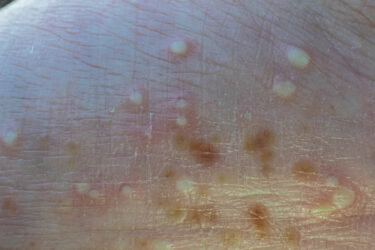Dr. Ted Rosen details FDA-approved spesolimab as the first drug specifically indicated for the treatment of generalized pustular psoriasis flares in adults.
Ted Rosen, MD, FAAD
Editor-in-Chief
Spesolimab (Spevigo, Boehringer Ingelheim Pharmaceuticals) is a humanized monoclonal IgG1 antibody directed against interleukin-36 (IL-36) signaling. This agent binds to IL-36R, thereby preventing activation of this receptor by ligands. This, in turn, prevents downstream activation pro-inflammatory pathways. It is unclear precisely how reduced IL-36R activation leads to resolution of pustular psoriasis flares.
Approval was based on a 12-week phase 2 trial (NCT03782792) where subjects either received a single 900 mg intravenous dose of spesolimab (N=35) or placebo (N=18).
Trial subjects had a mean age of 43 (range, 21 to 69 years); 68% were women; 45% were White and 55% were Asian. Prior to onset of the clinical trial, 43% had a global pustulation score of 3 (moderate) and 36% had a pustulation score of 4 (severe).
In the treatment group, 54% showed no obvious pustules one week following therapy compared to only 6% of those who received placebo infusion. Patients who continued to experience flare signs and symptoms at week 1 were eligible to receive a single open-label intravenous dose of 900 mg spesolimab. At week 2, 42% of those randomized to the study drug who received a second dose were free of visible pustules.
Due to the small number of patients studied, it is not possible to predict if responses would be better or worse based upon parameters such as age, gender, ethnicity, or baseline degree of pustulation.
The most common adverse event was infection—14% of those who received active drug developed an infection compared to 6% of those who received placebo. Of note, increased risk of infection (such as furunculosis, otitis externa, and vulvovaginal candidiasis) persisted through week 17. Other acute adverse events (> 5%) related to spesolimab therapy included: asthenia/fatigue, nausea and vomiting, headache, itching, infusion site bruising, and urinary tract infection.
In all studies using this drug, severe hypersensitivity reactions have rarely occurred.
Use of this drug is not recommended in those with active tuberculosis; therefore, before administration, patients should be evaluated for this infection (including latent tuberculosis). Moreover, spesolimab should not be administered to those with any other known active infection until that infection resolves or is adequately treated. Administration of live vaccines should be avoided during spesolimab therapy.


